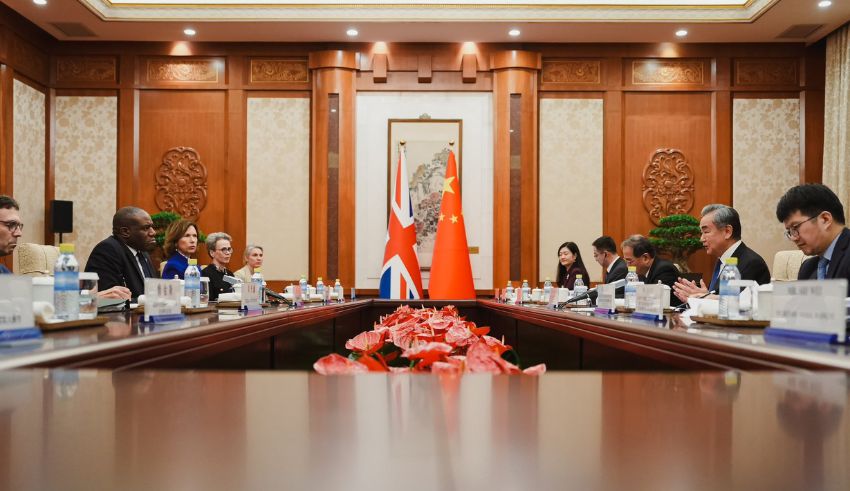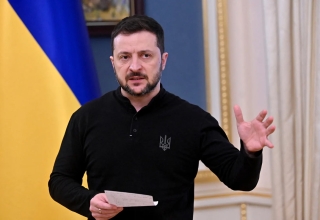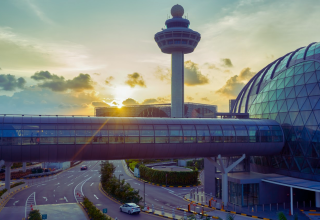
Aiming for prestigious Chinese figures like Foreign Minister Wang Yi and Vice Premier Ding Xuexiang, UK Foreign Secretary David Lammy is setting off a high-stakes diplomatic trip to China. The two-day tour addressing significant issues such Russia’s ongoing war in Ukraine, human rights abuses, and more general geopolitical challenges is seen as a vital event for both nations aiming to heal a relationship damaged by increasing enmity over recent years.
Lammy’s trip marks the first time a British Cabinet minister has visited China since Labour Prime Minister Keir Starmer took office in July 2024, thus it is especially significant Lammy’s ability to negotiate a delicate diplomatic line—working to strengthen ties with one of Britain’s most important trade partners while addressing key issues regarding human rights violations, China’s increasing proximity to Russia, and continuous security concerns in the region—is expected to be tested on the visit.
Pragmatism regarding accountability: diplomatic challenges
Lammy starts his two-day tour, so his diplomatic task is challenging. The UK government is resolved not to hold back on tackling contentious issues, even as it seeks to boost cooperation with China on world and economic difficulties. Emphasizing ahead of his trip the need for honest and open communication between the two countries, Lammy stated, “engagement with China is pragmatic and necessary to support UK and global interests.” “We have to talk often and honestly,” he advised in a Friday news release.
Underlying this approach, Downing Street emphasized that, especially on issues of human rights and democratic liberty, diplomatic engagement is still very vital even if the UK varies substantially from China. “Britain will challenge China where we need to,” a Downing Street spokeswoman said, adding Lammy will urge Chinese authorities to rethink their political and financial support for Russia’s ongoing onslaught of Ukraine. Driven to isolate Russia on the international scene, Western nations are concerned about China’s growing ties to Moscow as well as about Russia’s acts free from censure.
China’s methodical approach to the visit
From China’s perspective, Lammy’s travel offers an opportunity to heal a relationship that has suffered notable breakdown throughout the past five years. From economic to issues of world security, Beijing has hoped that the negotiations will generate more “strategic mutual trust” and increase collaboration and communication in many other fields. “Long-term stable development of bilateral relations accords with the common interests of both countries,” Mao Ning stated speaking for the Chinese Foreign Ministry. Mao underscored even more China’s will to help “the sound and steady development” of UK-China relations despite present diplomatic challenges.
China also understands the growing focus it is under on the international scene, particularly in connection to its impact on geopolitics and international human rights policies. China has positioned itself as objective in the Russia-Ukraine crisis, but its silence on criticism of Moscow’s actions and continuous commercial ties to Russia begs problems in London and other Western cities. Lammy’s visit should make a strong case for these issues; the UK most definitely guides Beijing on how its policies influence world stability.
UK-China Relations: From the “Golden Era” into the Era of Strain
Against the backdrop of difficult relations that have fundamentally changed from the early 2010s, when UK-China ties were hailed as starting a “Golden Era,” the following meetings took place. Inspired by financial cooperation and investments, former Prime Minister David Cameron said in 2015 that bilateral ties were in a “Golden Age”. At that time, both nations sought for a mutually beneficial relationship.
Lot has changed since then, but nonetheless. While increasing security, eavesdropping, and political meddling call into doubt other domains, the UK’s criticism of China’s human rights record—especially in Hong Kong—has led in diplomatic ties to sharply deteriorate. Particularly with regard to the South China Sea, China’s aggressive foreign policy has also added to rising tensions by means of its crackdown on dissidents in Hong Kong and treatment of ethnic minorities as the Uyghurs in Xinjiang.
Conflict primarily originates from Hong Kong
Among the main reasons for conflict in UK-China relations has been Hong Kong’s predicament. Returning to China in 1997, the former British colony was under the “one country, two systems” concept aimed to give the city a large degree of autonomy and preservation of her political and civil liberties. But Beijing implemented a thorough national security grip over Hong Kong in 2020 that has practically stopped months of pro-democracy protests and reduced the liberties once enjoyed by the people living there.
Strong opponent of China’s actions in Hong Kong, the UK has accused Beijing of violating the terms of the handover agreement and so compromising the city’s unique status. Seen as mostly internal, Britain has given British National (Overseas) citizens a route to citizenship, therefore souring ties with China.
Particularly in reference to the circumstances of well-known pro-democracy entrepreneur Jimmy Lai, who is presently imprisoned in Hong Kong, demands for human rights have been especially strong ahead of Lammy’s arrival. Lai’s legal team has urged the UK government to pursue his case forward during Lammy’s meetings with Chinese officials, calling for his release as part of larger overall attempts to remedy human rights abuses in the city. Prime Minister Starmer has also backed Lai’s release, suggesting Lammy’s negotiations most likely center on this matter.
Conflict between Russia and Ukraine: Test for UK Relations inside China
Still another contentious issue under debate is China’s stance on the Russia-Ukraine dispute. Since Russia’s invasion of Ukraine in February 2022, China has maintained a deliberately neutral posture, refusals to especially criticize Moscow’s actions notwithstanding continuous political and financial ties to Russia. Particularly in light of China’s growing ties to Russia in response to sanctions from other nations, the West has grown increasingly dubious of this approach.
Lammy is meant to urge Beijing to quit supporting Russia during his tour, therefore inspiring Chinese officials to participate actively in promoting peace. Beijing has openly denied providing Russia military support, but its economic ties to Moscow have helped the Russian economy to withstand some of the weight of the Western sanctions. Western countries, particularly the UK, have become enraged by China’s continuous cooperation with Russia since they view Beijing’s actions as jeopardizing efforts at political and economic isolation of Russia globally.
Trade diplomacy and economic policies
Political turbulence notwithstanding, UK-China relations are mostly dependent on economic cooperation. Lammy will be stressing the significance of maintaining tight commercial ties between the two countries by meeting British businessmen in Shanghai. China is among the major economic partners of the United Kingdom, hence both countries have an interest in ensuring consistent trade policy. Though it balances preserving trade and investment, the UK government is keen to assign China responsibility for political and human rights policies.
Regarding UK-China Relations, the future seems to be
Lammy’s visit will probably help UK-China relations under the Starmer government to be focused. China is a prominent actor on the global scene in terms of geopolitical power and economic impact as the UK is building its post-Brexit foreign policy. Still, the two countries negotiate a lot of challenges from opposing foreign policy targeted at security concerns and human rights issues.
Lammy will be under constant watch while negotiating challenging conditions from China. Although economic cooperation is still a top concern since the UK is unlikely to violate its obligations to human rights and international security, Lammy’s diplomatic approach will be a balancing act between pragmatism and morality even. Whether this visit might aggravate already existing problems or lead to a more favorable engagement between the two countries is still to be seen.
























